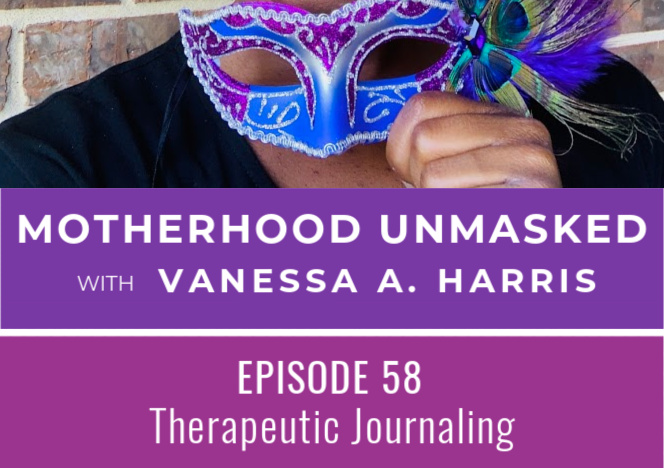If the thought of writing your thoughts and feelings in a journal sounds boring or worse frightening, in this episode, I talk about the benefits of journaling and the role it plays in maximizing your therapy sessions.
We’re talking journaling from A to Z.
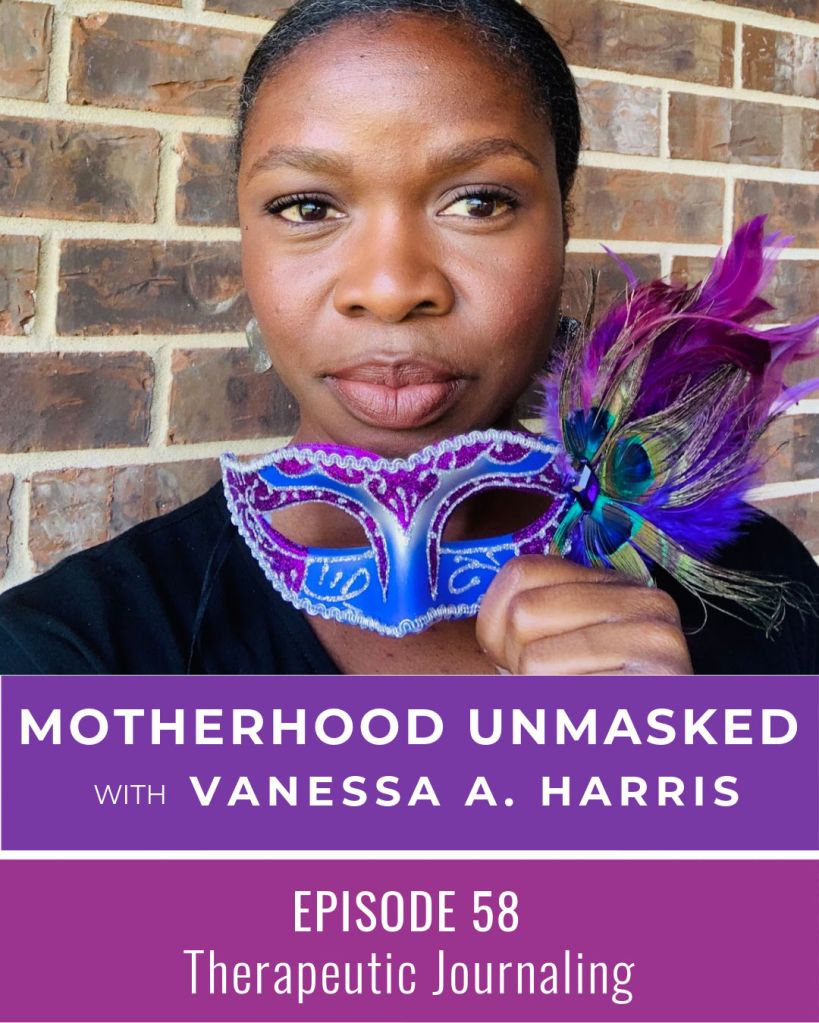
Subscribe to Motherhood Unmasked: Apple Podcasts | Spotify | Google Podcasts | Stitcher | TuneIn | iHeart Radio
EPISODE 58 TRANSCRIPT
Therapeutic Journaling
YIKES!
Motherhood can feel like a high-wire act with no net, especially if you have unresolved childhood trauma complicating matters. If that sounds like you, I’m so glad you’re here.
DO PEOPLE STILL JOURNAL?
I love a good journal! And you may be thinking who is writing anything in a book anymore—much less their innermost thoughts and feelings?
And you make a good point because so much of what passes for writing these days are thumbs furiously pecking at smart phones or all 10 fingers gliding across keyboards.
If for no other reason, journaling keeps my handwriting muscles active. I can literally tell when I’ve spent much of my day on my phone because writing feels clumsy.
But for the record, journaling isn’t about pen and paper. It’s processing thoughts and feelings outside of your head and you can do that electronically or old school.
Any way you do it, the benefits are the same. Journaling makes you more self aware.
BENEFITS OF JOURNALING
I’ve mentioned temperament types before and if you’re primarily melancholy, like myself, you’re used to analyzing everything and everyone, including yourself.
Thinking about what happened and why and how you feel about it is second nature to you. And I find myself going over those questions in my mind until I get them out of my head and write them down.
Something about writing brings focus and clarity, as well as catharsis. I feel better getting it out with the added benefit of looking back to see how devastated I felt about something one day and how I recovered later. Journals serve as a reminder that this too shall pass.
But most people aren’t reflective.
Sitting with their thoughts and feelings is uncomfortable, so they avoid them with activities to distract their minds or deaden their emotions.
But none of it goes away.
They’re just like apps running in the background of your smartphone, taking up space and draining your battery.
Journaling is a less threatening way of facing them than sharing with someone that can make sharing with someone easier in the long run.
And if you tend to ramble, journaling nudges you toward being direct. Maybe it’s all the practice writing paragraphs and essays in school that trains us to get to the point, but as you write you gain a clarity about issues that make it easier to express your concerns without censoring your feelings.
And that leads me to another benefit!
The paper or the locked note in your smart phone does not have feelings or opinions about what you share like people do.
If you practice self-awareness you may feel your mind is the only safe place to process your thoughts because if you said what you really wanted to, people wouldn’t understand, may think less of you or tell you your wrong.
KEEP IT REAL
But when I read the songs David wrote in the psalms, so many of them are so raw. You hear his sorrow, his vulnerability and his anger, but by the time song is over he’s talking about the goodness of God.
His perspective changed in the course of his writing.
And you know what? All that rawness made it into the Bible—unedited. God considered those psalms every bit as reflective of the beauty of his Son as John 3:16.
So, you are meant to express yourself and be comfortable doing so. And I know you may be wondering what people have asked me. Vanessa, aren’t you worried someone may read your journal?
And my answer.
They do so at their own risk, but you can believe they’ll know me better for having done so!
David didn’t know his songs would become scripture, but here you and I are thousands of years later benefiting because they did.
His psalms capture the total reality of the human condition and give us permission to express the same.
So by the time I started seeing a counselor, so much of the groundwork had already started. I had no problem sharing with her because I’d been sharing in a different format for years.
And when she assigned me to journal about something covered in our session, I didn’t find it overwhelming because I would have journaled about it anyway—even if she hadn’t assigned it.
I wanted to dedicate an episode to journaling because though I talk about it all the time, I wanted to share how it’s helped me and walk you through potential benefits for you.
Because if you buried childhood trauma because someone told you to get over it, digging it up is no easy ask.
It takes baby steps in a safe environment and journaling can give you that. Journaling does not replace the need for counseling, but it is a tool many therapists use in some facet of their practice.
JOURNALING 411
There are so many journals out there and so many places to get them from book stores to Amazon to TJMaxx and at a variety of price points. You can get a 50 cent notebook from Walmart or use the notes app you’re already paying for on your phone.
As far as what to say—just go for it.
Doesn’t need to be an essay. You can write a word if that’s all you can manage that day. Next time you may have more to say, but you’ve given yourself permission to say. And that’s the point.
I’m so passionate about journaling I’ve created some of my own lined journals for a variety of uses.
MY PERSONAL FAVS
The first one I made is an everyday journal. At the bottom of every page there are alternating affirmations and Bible verses that confront common lies women believe.
But once I started counseling, I realized writing my session notes on loose leaf pages wasn’t going to cut it.
So I published a journal with sections for me to write thoughts that I want to address during the session, a section for truths uncovered about those thoughts and a section to record the nuggets I’m taking away from the session along with any homework my counselor gives me.
Why?
Well, one, good counseling is not free and two, this therapy journal allows me to see what we’ve covered and the growth I’ve experienced which is key to establishing the sessions are beneficial and to celebrating your wins.
Also, the real work happens between sessions and when you have somewhere to record what you’ve experienced you can have more productive counseling sessions. You can see where you’ve gained closure and what you need to lean into more.
The grief journal is where you can wrestle with your loss—and I mean the gamut of them. As I’ve shared in an earlier episode, grief is more than the death of a loved one.
For you it can be the death of a real childhood, the death of trust, the death of a relationship, or any loss of significant impact.
Many of the things I’ve worked through in counseling are losses I never allowed myself to grieve in my attempts to get over them and move on.
So it’s good to have a dedicated space to note what/who I miss, what about them having been in my life I’m grateful for, and what I’ll always remember to cherish from that time.
And of course, I need a journal for us mamas. A place to write about the trials and triumphs of this mom life.
Whether you’re a new mom or a veteran, it’s awesome to look back and see what you wrote about experiences you thought you’d never survive and children you thought you completely failed with and realize you both made it out alright.
So whether you need a prompt to give you a jumping off point or you know exactly what you need to get off your chest, there is a journal out there waiting for you.
If you’d like more food for thought on the uses and benefits of journaling, check out this week’s food for thought post on motherhoodunmasked.com. That’s motherhoodunmasked.com. I share food for thought on Thursdays, two days after that week’s episode airs.
Motherhoodunmasked.com/episode58 is also where you can find links to the journals I mentioned in this episode.
I hope my time on my journaling soap box showed you how accessible and helpful journaling can be. And although it does not replace the need for professional counseling, you may find it a handy tool to get the most mileage out of your therapy sessions (pun intended).
And until next time, please remember. When it comes to you being the mother of your children, you are the woman for the job. I’m rooting for you. Take care.
NOTE: The views and opinions expressed in this podcast should not be taken as medical advice. The content here is for informational purposes only, and because each person is so unique, please consult your health care professional for any medical questions.
CLICK HERE FOR MORE FOOD FOR THOUGHT.
Need Help to Heal?
Looking for a journal?
Journal from the Heart is a great every day journal with an encouraging verse or affirmation at the bottom of every page. If you’re working through any kind of loss, the journal, My Journey Through Grief and Loss, helps you acknowledge the significance of your loss while honoring the memories you’ll always cherish. And if you meet with a counselor or a coach, you need a journal to keep track of breakthroughs and aha moments in between sessions. A copy of the My Reflections Journal for guided post-session review would be perfect for you.
The Motherhood Unmasked Journal
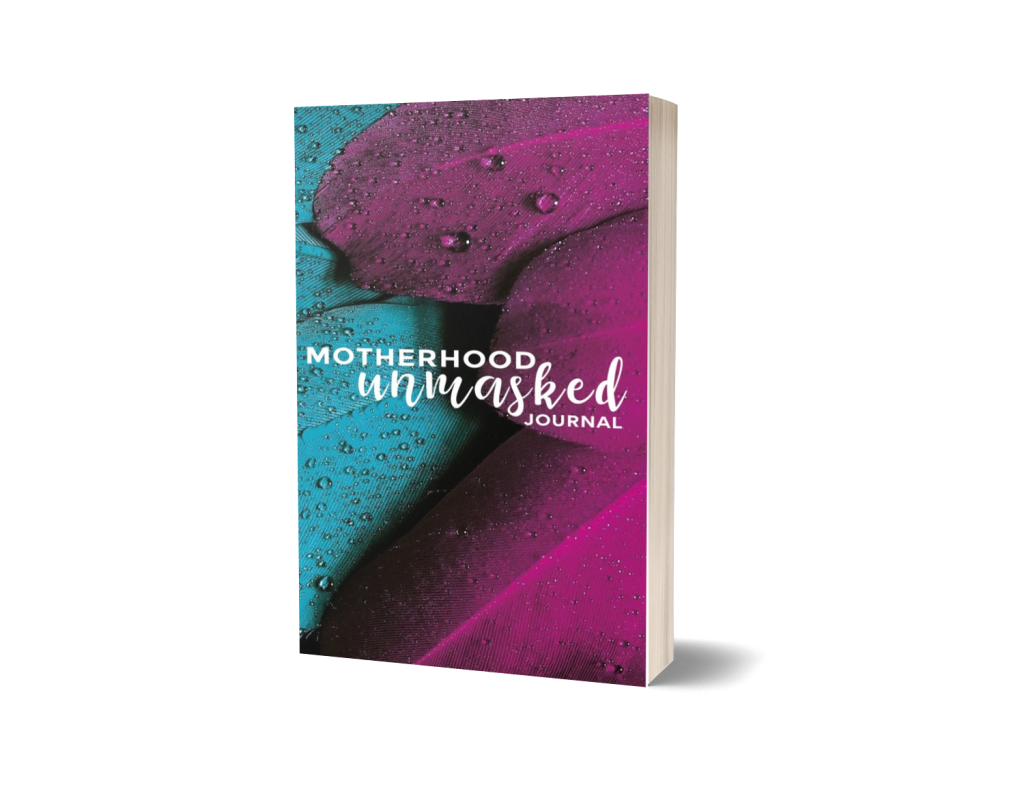
A Journal Worth Your Story
160 pages waiting for you to fill it with the struggles and the wins on your motherhood journey!
And she’s pretty coming and going! Available on Amazon.
Got A Minute to Pray?
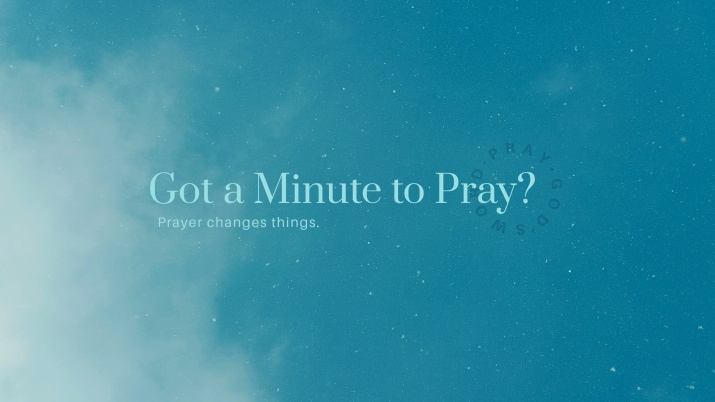
New “PrayerTube” channel on YouTube
Features prayers about a minute long written and read by Vanessa. Start your week off right, with a prayer on Monday mornings. Because prayer changes things and you have a minute to spare.
Let’s Stay Connected
Do you know why I call you Mama BARE? Because you’re unmasked and unapologetic in admitting motherhood is tough, and you appreciate conversation that honors that.
So, connect with me for more support, empowering the best version of you as a mom.
For encouraging bi-monthly emails and exclusive access to practical resources that help YOU shine, tap “COUNT ME IN.”
Let’s Be Social!
Ready for MORE Motherhood Unmasked episodes?
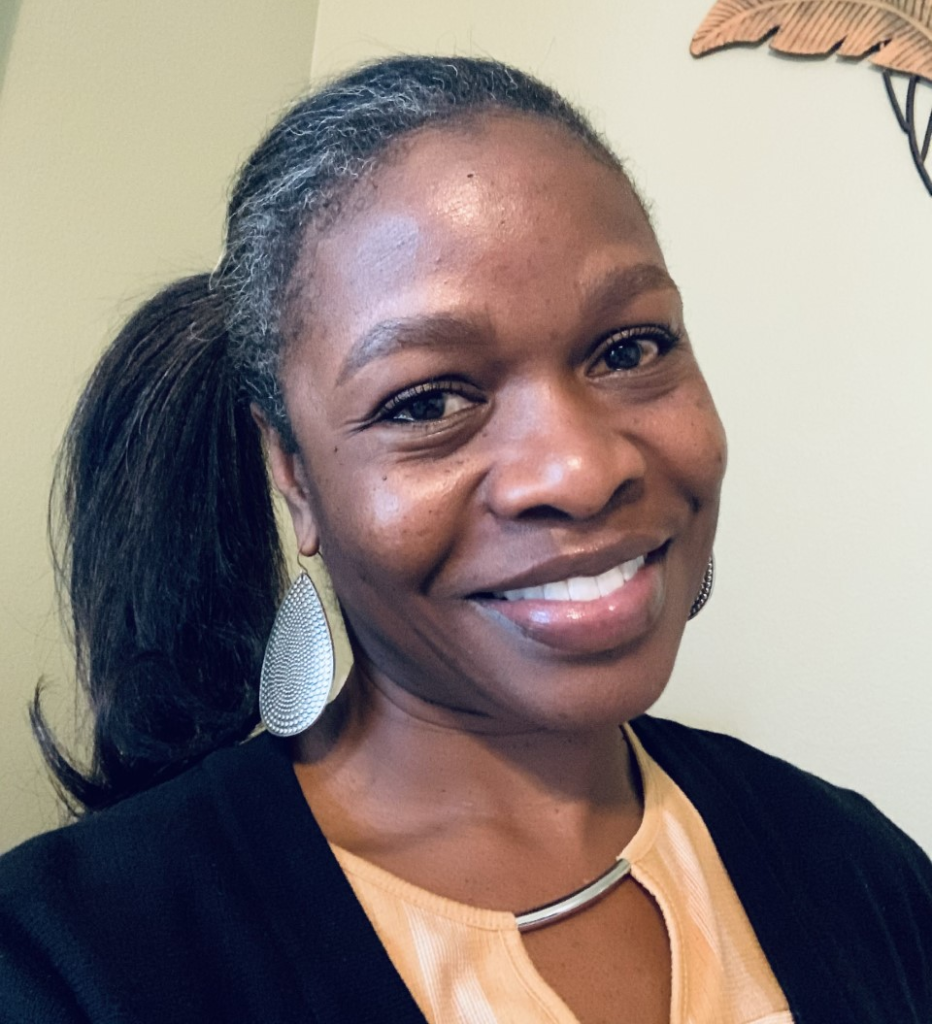
Copyright 2022 to date Vanessa A. Harris. All rights reserved.
